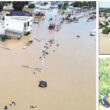The Kano State Government has raised the alarm over toxic air in several parts of the state capital, citing a recent report from the Ministry of Environment and Climate Change. The findings have caused serious concern among residents, especially in areas where cases of respiratory infections appear to be on the rise.
According to the report, which covers the period from May 26 to May 30, air pollution levels in neighborhoods such as Gaida, Ja’en, Sabon Titi, and Sharada Market have reached dangerous levels. These areas fall under Kano Municipal and Kumbotso Local Government Areas. Officials warn that the current air conditions pose a threat to public health, particularly due to fine particles present in the atmosphere.
“The further loss of air quality may contribute spreading respiratory illnesses and other diseases associated with pollution,” the report noted.
The Commissioner for Environment and Climate Change, Dr. Dahir M. Hashim, shared the findings on his official Facebook page. He reminded the public that protecting the environment is a shared responsibility. “It is the duty of us all to take care of the environment. Environmental stewardship is the responsibility of both the government and the public,” he said.
He also noted the worsening state of environmental degradation in the region, saying that the government is looking into necessary steps to address the situation.
Residents in the affected areas are already feeling the impact. In Ja’en, Ibrahim Sulaiman, who lives close to an industrial site, said the rise in health problems isn’t surprising. “We live close to an industrial zone, and many of these companies release different chemical substances and emit strong odors, especially at night,” he said.
He described how a neighbor had been coughing nonstop for nearly two weeks and now his entire family has fallen ill.
In Gaida, Shamsu Tijjani, who recently recovered from tuberculosis, said residents agree with the government’s findings. “There are neighborhoods that are so dense; there is absolutely no urban planning,” he said. “You can’t turn in any direction without seeing construction.”
He also mentioned how the overcrowded areas, lack of ventilation, and increased pollution have worsened living conditions and possibly contributed to his own illness.
Residents across the affected locations are urging authorities to take swift action to improve air quality and stop further damage to both the environment and public health.
As of June 3, 2025, data from IQAir put Kano’s Air Quality Index (AQI) at 79, which falls into the “Moderate” category. The main pollutant identified is PM2.5—fine particles measuring less than 2.5 micrometers in diameter. These can penetrate deep into the lungs and even enter the bloodstream, increasing the risk of heart and lung disease.
Professor Isa Abubakar, a consultant physician at Aminu Kano Teaching Hospital, said in a phone interview that long-term exposure to such pollution could lead to severe health conditions. “Air pollution can lead to asthma attacks and other forms of respiratory disease; over time you can even have lung cancer or neurological diseases like Parkinson’s disease and Alzheimer’s or other mental health issues.”
For those in high-risk zones, he advised either relocating or using face masks and reducing time spent outdoors. “This can provide some level of protection,” he said.










